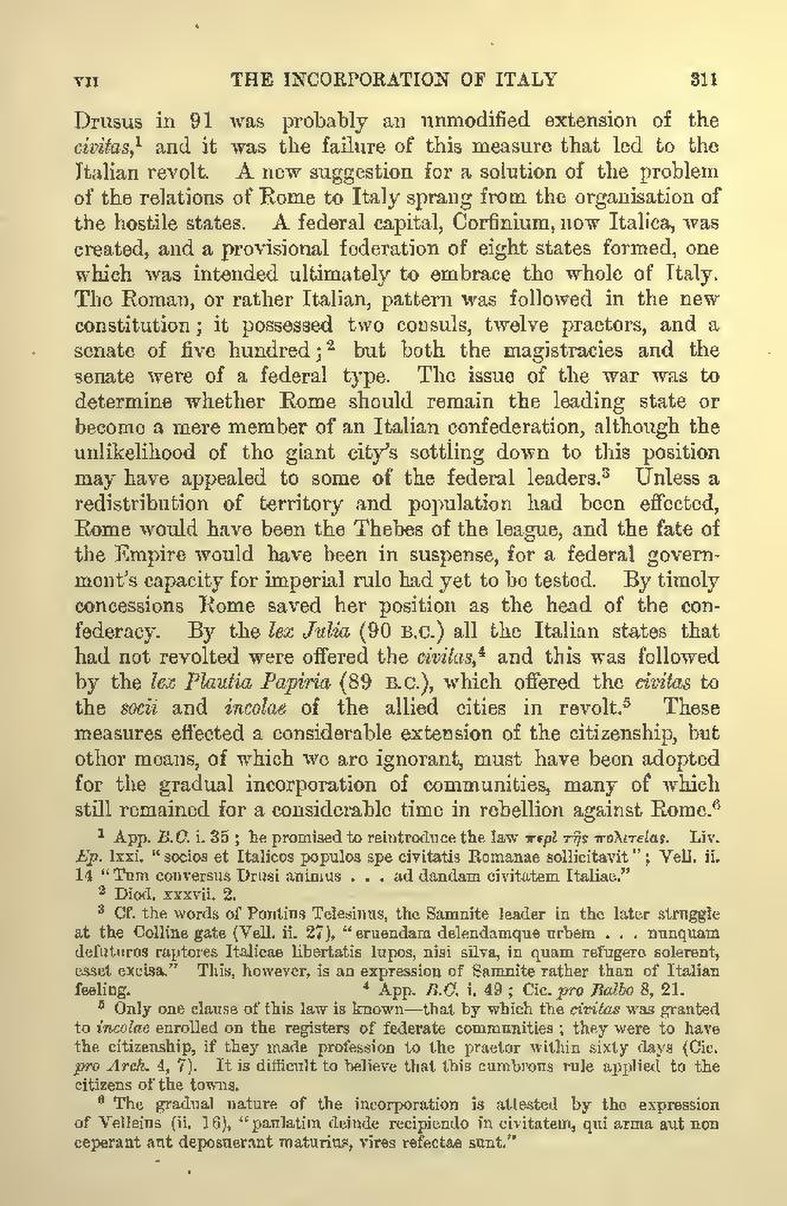Drusus in 91 was probably an unmodified extension of the civitas,[1] and it was the failure of this measure that led to the Italian revolt. A new suggestion for a solution of the problem of the relations of Rome to Italy sprang from the organisation of the hostile states. A federal capital, Corfinium, now Italica, was created, and a provisional federation of eight states formed, one which was intended ultimately to embrace the whole of Italy. The Roman, or rather Italian, pattern was followed in the new constitution; it possessed two consuls, twelve praetors, and a senate of five hundred;[2] but both the magistracies and the senate were of a federal type. The issue of the war was to determine whether Rome should remain the leading state or become a mere member of an Italian confederation, although the unlikelihood of the giant city's settling down to this position may have appealed to some of the federal leaders.[3] Unless a redistribution of territory and population had been effected, Rome would have been the Thebes of the league, and the fate of the Empire would have been in suspense, for a federal government's capacity for imperial rule had yet to be tested. By timely concessions Rome saved her position as the head of the confederacy. By the lex Julia (90 B.C.) all the Italian states that had not revolted were offered the civitas,[4] and this was followed by the lex Plautia Papiria (89 B.C.), which offered the civitas to the socii and incolae of the allied cities in revolt.[5] These measures effected a considerable extension of the citizenship, but other means, of which we are ignorant, must have been adopted for the gradual incorporation of communities, many of which still remained for a considerable time in rebellion against Rome.[6]. Liv. Ep. lxxi. "socios et Italicos populos spe civitatis Romanae sollicitavit"; Vell. ii. 14 "Tum conversus Drusi animus . . . ad dandam civitatem Italiae."]
- ↑ App. B.C. i. 35; he promised to reintroduce the law [Greek: peri tês politeias
- ↑ Diod. xxxvii. 2.
- ↑ Cf. the words of Pontius Telesinus, the Samnite leader in the later struggle at the Colline gate (Vell. ii. 27), "eruendam delendamque urbem . . . nunquam defuturos raptores Italicae libertatis lupos, nisi silva, in quam refugere solerent, esset excisa." This, however, is an expression of Samnite rather than of Italian feeling.
- ↑ App. B.C. i. 49; Cic. pro Balbo 8, 21.
- ↑ Only one clause of this law is known—that by which the civitas was granted to incolae enrolled on the registers of federate communities; they were to have the citizenship, if they made profession to the praetor within sixty days (Cic. pro Arch. 4, 7). It is difficult to believe that this cumbrous rule applied to the citizens of the towns.
- ↑ The gradual nature of the incorporation is attested by the expression of Velleius (ii. 16), "paulatim deinde recipiendo in civitatem, qui arma aut non ceperant aut deposuerant maturius, vires refectae sunt."
